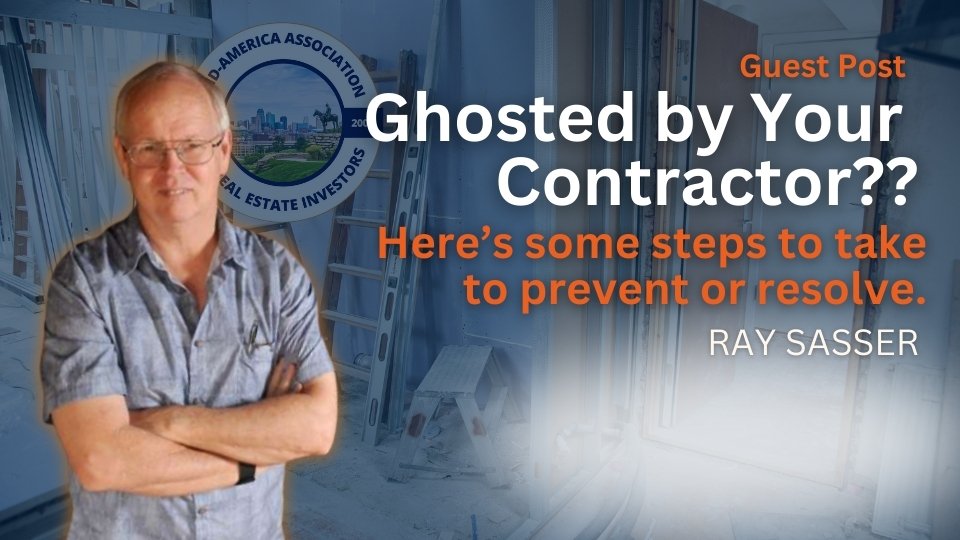
What to Do When a Contractor Won’t Finish the Job:
Hiring a contractor can be one of the biggest challenges in real estate investing. While many do excellent work, there are plenty who overpromise and underdeliver—and some even walk off jobs before they’re done.
In a recent Lone Star REIA podcast (watch here), veteran investor Ray Sasser shared his insights on why contractors abandon projects, how to prevent it, and what to do if you’re left with an unfinished job.
Why Contractors Walk Off Jobs
Ray was blunt about the reality:
“The contractor is not a legitimate or honorable contractor. They’ve done the math, and they found out they can’t finish the job with the amount of money that’s left. And so—they’re done.”
The hard truth is that many contractors use deposits from new jobs to finish their last project. When they realize there’s not enough money left to profit from your project, they move on—leaving you with an incomplete house and a major headache.
How to Prevent a Contractor from Leaving Your Job Unfinished
Ray outlined several key strategies to protect yourself:
✔️ Never Pay Large Deposits Upfront.
- Some contractors ask for a third or even half of the total cost before starting.
- Instead, offer a small start-up payment (e.g., $1,500) and use progress payments based on completed work.
✔️ Have a Clear Scope of Work.
- Every project should have a detailed, written scope of work that outlines exactly what needs to be done.
- This prevents underbidding and ensures you know what’s included—and what’s not.
✔️ Pay for Work as It’s Completed.
- Instead of paying upfront, set progress milestones (e.g., framing, drywall, electrical) and release payments only when each phase is done.
- Keep a substantial final payment to ensure they finish the job.
✔️ Work with a Trusted Vendor Network.
- If contractors know that walking off a job means losing future work, they are less likely to abandon a project.
- Building relationships with reputable vendors is key to avoiding bad actors.
What to Do If a Contractor Walks Off
If you’re already in this situation, you have to be aggressive in getting results. Ray calls it being a “Monster for Outcomes” (MFO):
“If you’re a little kitten in the corner meowing, you’re going to get stomped on. You have to be a ‘Monster for Outcomes’ and do whatever it takes to get the job done.”
Here’s what you can do:
🔹 Negotiate First. Start politely—ask if they’ll come back to finish the job.
🔹 Use Leverage. If they rely on referrals or are part of a vendor network, threaten to cut off future business if they don’t finish the job.
🔹 Call in Licensed Subcontractors. While Texas doesn’t require general contractor licenses, electricians, plumbers, and HVAC technicians must be licensed.
- If their licenses are on the line, they’re more likely to finish their part of the job.
🔹 Avoid Legal Battles Unless Necessary. Suing a contractor in Texas is tough—many will shut down their business and reopen under a new name to avoid paying judgments.
Want to Learn How to Find, Hire & Manage the Right Contractors?What to Do If a Contractor Walks Off
Contractors can make or break your rehab projects, so learning to manage them correctly is essential.
That’s why Ray Sasser is hosting a Master Class on Saturday, March 8th, teaching investors:
✅ How to find reliable contractors
✅ How to properly structure contracts
✅ How to ensure jobs get completed on time and on budget
🎟 Reserve your spot here: MAREI Master Class – March 8th
This could be the difference between getting burned by bad contractors and running your projects smoothly and profitably.

Ray Sasser
Ray Sasser is a seasoned real estate investor with over 40 years of experience in buying, rehabbing, and managing investment properties. As a former general contractor and past president of one of the nation’s largest REIAs, Ray has helped countless investors navigate the challenges of working with contractors. He specializes in creative financing, project management, and investor coaching. Ray is a co-founder of Alamo & Lone Star REIAs and regularly shares his expertise through workshops, podcasts, and live training events.
Visit website: https://www.alamoreia.org/





